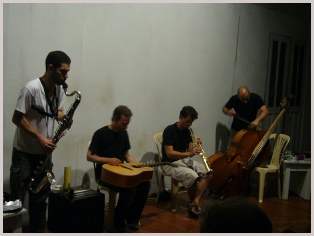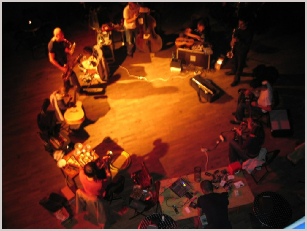Another Timbre TimHarrisonbre


with Sharif Sehnaoui, Stéphane Rives and Raed Yassine
At what age did you start playing music, and what instrument did you first play?
I was 14 when I started playing the guitar. At the age of 17 I moved to wind instruments, starting with the ney and shortly after the flute and the clarinet.
How and when did you first come into contact with improvised music?
It was kind of a revelation to me. I was completely absorbed by this relaxation of boundaries. I was already feeling very frustrated with the focus on tones and found it much more interesting to go back to one of the reasons why music resonates in us, and which has to do with the nature, the texture of the sound.
Is your style of playing the ney influenced by traditional music?
Of course. Traditional Arabic music (and to some extent Turkish, Persian, etc) is mostly based on improvisation. You have centuries of thinking improvisation when you enter this door, thinking texture of sound, intensity, silences, etc. Arabic music for example is modal and its tonal structure is much more complex than today's Western music. Middle Age European music may resemble it more in structure because tonal intervals are not the simplified 12-note chromatic scale that you use today and on which modern 'harmony' is built. But this has a lot to do with this new development in music which is 'composition', especially in its written form. The more you move to a composed form of music (written vs oral) the more you lose the subtleties related to everything that comes with the sound. It is interesting to see how contemporary western music struggles with these forms after having several centuries of the predominance of composition. Alas, Arabic music has fallen prey to European "standards" and has struggled to "write" its music and thus is losing much of its potential. The power of the oral tradition brings improvisation to the forefront.
What is the improv scene like in Lebanon today?
Well as you may know, Lebanon is successively undergoing severe political crises which make it hard to promote anything long-lasting at the artistic level. Except for an annual festival that is organized by MILL (Musique Improvisée Libre au Liban), an association founded by Sharif Sehnaoui, Mazen Kerbaj and Christine Sehnaoui. Now we are all in all 7 musicians who also founded the first experimental ensemble in the Middle East, Moukhtabar Ensemble (meaning ‘the Laboratory’ in Arabic). Most of these musicians live (and play music) outside of Lebanon most of the year.
What is the audience for this kind of music in Lebanon?
The audience is pretty much the same as in any other 'modern' society: a tiny minority of either music aficionados, artists of all types, curious, musicians or just friends being dragged along! Of course Beirut is much smaller than London and so you have to divide then the number of the curious by 20...
Is there any state support for improvised / new music in Lebanon?
None whatsoever.
How did the Al-Maslakh cd label come into being, and what are its aims?
Since MILL was founded and its festival IRTIJAL (which means ‘Improvisation’ in Arabic) started being organized, the idea of Al Maslakh was there, but it took time to materialise. The basic idea was that we needed to document what was happening in Lebanon in this regard. And we needed something that could take what we were doing outside Lebanon. It is Mazen and Sharif who run the label, and Mazen draws the covers.
A handful of Lebanese improvisers are now known in Europe (Mazen Kerbaj, Sharif & Christine Sehnahoui, yourself). Are there others coming up who we should look out for?
There are also Jassem Hindi who plays electronics and is based in Paris, as well as Raed Yassine who is now based in Holland. Also there is Charbel Haber who is a guitar player and lives in Lebanon and is lead guitar and singer in Scrambled Eggs, a Lebanese rock band.
The only other middle eastern country that I'm aware of having an improvised music scene is Israel. Are there any contacts between Israeli and Lebanese improvisers, or is such an idea ridiculously utopian?
I don't know what you mean by contacts but we are not a priori against playing with Israeli musicians as long as they don't support (or live in denial of) the destructive and murderous policies of their government. We actually played with Dror Feiler, an Israeli saxophone player and artist who lives in Sweden, while we were touring there. But Dror is a strong and outspoken critic of the Israeli government, so he is welcome to play with us! But I don't want to speak on behalf of all the Lebanese players, this is just my opinion.
The American percussionist Michael Zerang released a disc on Al-Maslakh on which he plays with a number of Lebanese musicians on different tracks. On your duo with him you play in a different style from your other recordings. How did this recording come about?
Michael wanted to play something that mixed traditional ways of playing with more free types of improvisation. So we tried and that was one of these experiments. It was the first time I had played in this context, because I am either completely immersed into a free improvisation setting or a hermetically traditional way of playing.
On the CD 'Oranges' on 'Creative Sources' you play with Wade Matthews (who also plays flute and bass clarinet), and the string players Ernesto and Guilhermo Rodrigues. How did that come about?
Very simply by going to Lisbon and finding that Wade was going there during the same period. We just met one night and played and the next day we went to record in a studio. I knew Wade from Lebanon and have profound respect for his work. I am always excited to play with him. In a certain sense he is the main musician who convinced me of how fascinating free improvisation could be.
You recently spent a year in London. How did you find the improv scene there?
I quickly met improvisers in London, and I loved playing there especially because people there are so open to any possibility.
While in London you attended Eddie Prevost's improvisation workshop. That seems to be a really important base for new young players in the UK. What did you make of it?
I think Eddie's workshop is great for many reasons. First because I had the occasion to meet with very interesting musicians like Matt Milton, Seymour Wright, Nicholas Christian and others. Most important of all is that it is very respectful of what improvisation can be. Unfortunately (and that is just my opinion) it could be more used by other musicians based in London.
Which musical collaborations that you made in London were particularly important to you, and will you be able to continue them now that you've returned to Beirut?
I have duos with Nicholas Christian (electric bass), and Clive Bell (shakuhachi), both of which I hope to continue. I also have something going on with Samantha Rebello and Angharad Davies, or probably wish that I had (!) because I think these two musicians are just great.
At the 2007 Freedom of the City Festival you played a trio with Matt Davis & Matt Milton. In The Wire Clive Bell recently referred to this as "young musicians reinventing improvised music" Was it that good?
Well it was great! It was Matt Milton who came up with the idea, and it really worked.
'Hum' on 'another timbre' also has Matt Davis, but this time with the harpist Rhodri Davies and the flautist Samantha Rebello. What did you make of this grouping?
This was one of the subtlest sound experiences I’ve had so far. I'm so happy it got recorded. I never felt so much concentration while playing.
You have also performed in Berlin. What was the occasion, and how did the improv scene in Berlin strike you as compared to London ?
We were invited to play at the Tasten festival. ‘We’ as in some of the Lebanese crew. I was there just for a couple of days, but surely Berlin is the paradise city for musicians, at least in terms of a base, and mainly because rent is cheap. In fact that may be the main difference between the cities. So there are a lot of musicians there.
Your duo cd with Clive Bell (‘an account of my hut’ ) is out now. It is a unique combination of two non-western instruments: the ney and the shakuhachi. Does your playing here differ from your bass clarinet work on 'Oranges' and 'Hum'?
With Clive we try to see how these very dense sounding woodwind instruments can interact. So we borrow a lot from the traditional airs from where these instruments come. So in this way it may be different. But in terms of the overall "philosophy" of playing, nothing has changed.
I feel that the music on the duo has a more classical feel than most improv. Do you agree?
Well I don't know if classical is the right term, but it is surely different. We are hypnotized by the sound of the wood, and so we try to work with it.
You play bass clarinet, flute & ney in different improv situations. Does your playing style vary considerably from instrument to instrument?
The ney is the instrument I spend most of my time with. It may be a bit simplistic, but it is my favourite sound, no doubt about that. But in free improvisation as the focus is more on textures, the ney is kind of limited because it does what it does and that’s it. So the bass clarinet fills this gap. But most of the time I use ney techniques of blowing when I’m playing the bass clarinet, but because it has a much larger and thicker body sound the possibilities are greater.
What musical collaborations are you currently involved in?
Well aside from the duo with Clive, I play with Nicholas Christian, and the Moukhtabar ensemble grouping of Lebanese musicians. Apart from that, I have other Arabic 'traditional' playing projects.
Is there any improviser with whom you'd particularly like to play in the future?
Well I'd like to play with whoever wants to play! I do wish I could play again with Samantha Rebello and Angharad Davies. But I'll need to come back to London for that…..